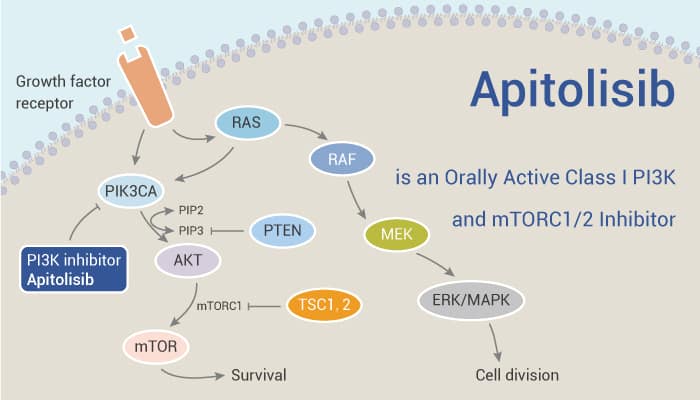Activation of the pathway occurs following activating point mutations or amplification of the PIK3CA gene encoding the p110a PI3K isoform.
Oncogenes such as PI3K, AKT, epidermal growth factor receptor (EGFR), and human epithelial growth factor receptor 2 (HER2) stimulate proliferation, growth, and survival by activating mTOR kinase.
The mTOR kinase contains 2 protein complexes, mTORC1 and mTORC2. Furthermore, we will introduce a is a selective, potent, orally bioavailable Class I PI3 kinase and mTOR kinase (TORC1/2) inhibitor, Apitolisib. Additionally, the IC50s are 5 nM/27 nM/7 nM/14 nM for PI3Kα/PI3Kβ/PI3Kδ/PI3Kγ, respectively.

Apitolisib is remarkably selective for several other members of the closely related PIKK family kinases. Besides, the IC50 values are 1300nM; 794 nM; 2000 nM;623 nM for C2alpha; C2beta; VPS34 and DNA-PK Kiapp, respectively.
A recent study shows that Apitolisib reduces cancer cell viability by inhibiting cell-cycle procession and inducing apoptosis with the most potency in many cancer cells. For example, It against prostate cell lines with an IC50 < 200 nM.
In vivo, Apitolisib (1 mg/kg) demonstrates significant efficacy in mouse xenografts. At the same time, it is currently in phase I clinical trials for cancer. Clearance and PPB are low, and Apitolisib shows dose-proportional exposure from 5 mg/kg to 50 mg/kg dosed in suspension in MCT, a finding attributed partially to the compound’s good solubility.
What’s more, Apitolisib at 5 mg/kg results in greater than 50% TGI in 15 of the 20 xenograft models. The difference in tumor response to Apitolisib treatment correlates with the duration of knockdown of pAkt/tAkt.
In conclusion, Apitolisib is a potent small-molecule inhibitor with selectivity for class I PI3K and mTOR kinase.
Apitolisib strongly inhibits the PI3K pathway and decreases tumor cell viability in a broad set of cancer cell lines: prostate (IC50 < 200 nM 50%), breast (IC50 <200 nM 37%) and NSCLC lines (IC50 <200 nM 29%) . And it exhits less potency in pancreatic (IC50 <200 nM 13%) and melanoma cell lines (IC50 <200 nM 0%).
In summary, Apitolisib, a potent inhibitor of class I PI3K and mTOR kinase. And it is promising for clinical trials in cancer as either a single agent or in combination with antimitotic agents.
[1]. Sutherlin DP, et al. J Med Chem, 2011, 54(21), 7579-7587.
[2]. Wallin JJ, et al. Mol Cancer Ther, 2011, 10(12), 2426-2436.